For the past several months, we’ve been talking a lot about the importance of strong company culture. You see, we believe that a winning culture is the difference-maker for the world’s most successful organizations.
But, we wanted to test our theories and gather some data on the subject. That’s why we conducted a short survey to determine what it takes to develop a strong company culture.
Today, we’re excited to reveal the results of our company culture research!
We’ve got some interesting insights for you that may help you strengthen the culture of your organization.
Culture Survey Participant Overview
Before we dive into the results, here’s a quick overview of the survey participants. We asked 289 people a series of 15 questions about their organization’s culture. Here are some additional stats about the respondents:
- Age: Respondent ages ranged from 18 to 74.
- Gender: 67% were female, 33% were male.
- Locations: respondents came from 36 states.
- Industries: Respondents came from more than 20 industries.
- Company size: Respondents came from companies of 1 to more than 1,000.
We received a wide range of responses from people of different ages, locations, industries and company sizes. This gave us a good cross section of feedback and data to work with.
How Employees Rate Their Company Culture
Now that you know who took the survey, let’s look at how they responded. We’re bringing you our key highlights and analysis for the data we collected. To get started, let’s take a look at how respondents rated their company culture.
1. Half of participants believe they have a strong company culture.
We asked all participants to rate their company’s culture. Somewhat surprisingly, more than half of respondents (55%) ranked their culture as “strong” or “very strong”. However, it is worth noting that a fairly large portion (27%) ranked their culture as “fair.”
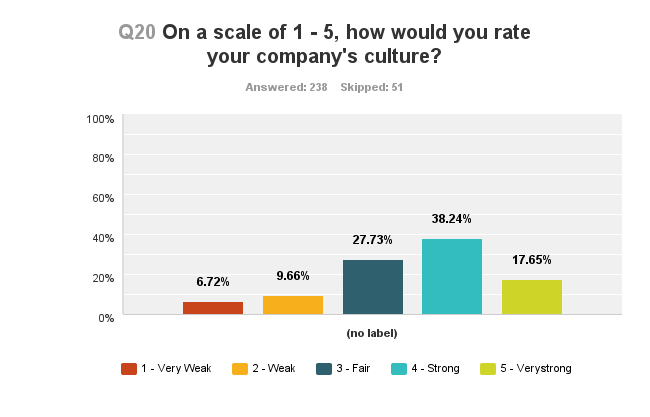 Key takeaway: We are pleased to see that so many companies have a strong culture, but this shows there is still room for improvement with nearly half ranking their culture as “fair” or “weak.”
Key takeaway: We are pleased to see that so many companies have a strong culture, but this shows there is still room for improvement with nearly half ranking their culture as “fair” or “weak.”
2. Founders & executives rate their culture higher than employees.
When we segmented the results about culture rankings by job type, we uncovered some interesting data. What we found is that founders and company leaders rank their culture higher than employees who do not hold leadership positions.
On average, company founders rated their culture 12% higher than non-founders and executives rated their culture 13% higher than non-executives.
Here’s the specific breakdown:
- 68.5% of founders rated their culture as “strong” or “very strong” compared to 50.3% of non-founders.
- 67.6% of executive leaders rated their culture as “strong” or “very strong” compared to 46.13% of non-leaders.
Key takeaway: It comes as no surprise that company founders and leaders are most likely to have a more positive view of their culture. However, this underscores the importance of regularly surveying your team and getting a “gut check” on the pulse of your organization’s culture. It might be that you have an inflated perception of reality.
3. Most people believe their company is a good place to work.
Even though a little more than half of people believe they have a strong culture, nearly three-fourths (74%) of respondents rated their company as a “good” or “very good” place to work.
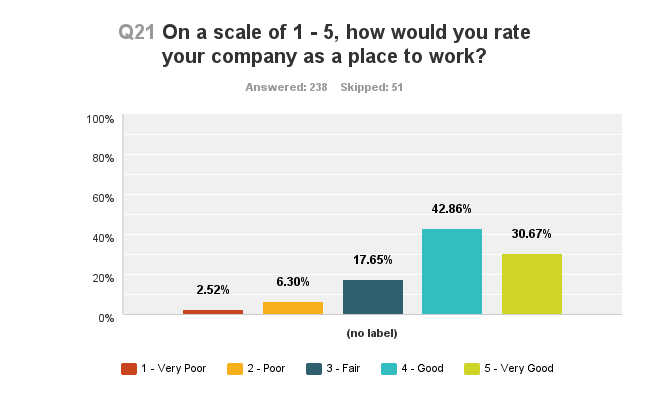 While there is some correlation on quality of workplace with culture, there are other factors that contribute to whether someone believes their company is a good place to work. Further research is required to determine what makes a company considered a good place to work.
While there is some correlation on quality of workplace with culture, there are other factors that contribute to whether someone believes their company is a good place to work. Further research is required to determine what makes a company considered a good place to work.
However, it is interesting to note that just like the culture question, founders and executives were more likely to rate their company as a good place to work. On average, founders rated their companies 9% higher than non-founders and executives rated their companies 11% higher than non executives.
Here’s the breakdown:
- 84.94% of founders rated their company as a “good” or “very good” place to work compared to 68.49% of non-founders.
- 86.11% of executives rated their company as a “good” or “very good” place to work compared to 63.07% of non-leaders.
Key takeaway: Company culture may impact the quality of your workplace, but it’s not the only factor for your employees.
Characteristics of Companies with Strong Culture
The most interesting part of our research came by looking at the results from participants who rated their culture as “strong” or “very strong”. We wanted to understand the key characteristics of these organizations to determine the secret sauce to creating a winning culture.
The following analysis reveals what we found by slicing our data to look at the responses of those who rated their culture as “strong” or “very strong”. If you want to create a strong, thriving company culture, follow the example of these companies.
4. Mission, vision and values create strong culture.
We have always believed in the power and importance of a creating a compelling and clear mission, vision and core values. We were thrilled to see that organizations with strong culture agreed with this idea.
In fact, a whopping 93% of respondents with strong culture said their organization has core values. Additionally, 67% of these respondents said their core values are written down in a place where the whole company can see them. When you contrast that with respondents who have a weak culture, only 62% of those companies have core values.
We see similar numbers for mission and vision statements. Here’s the specific breakdown from respondents with “strong or “very strong” culture compared to those with a “weak” or “very weak” culture:
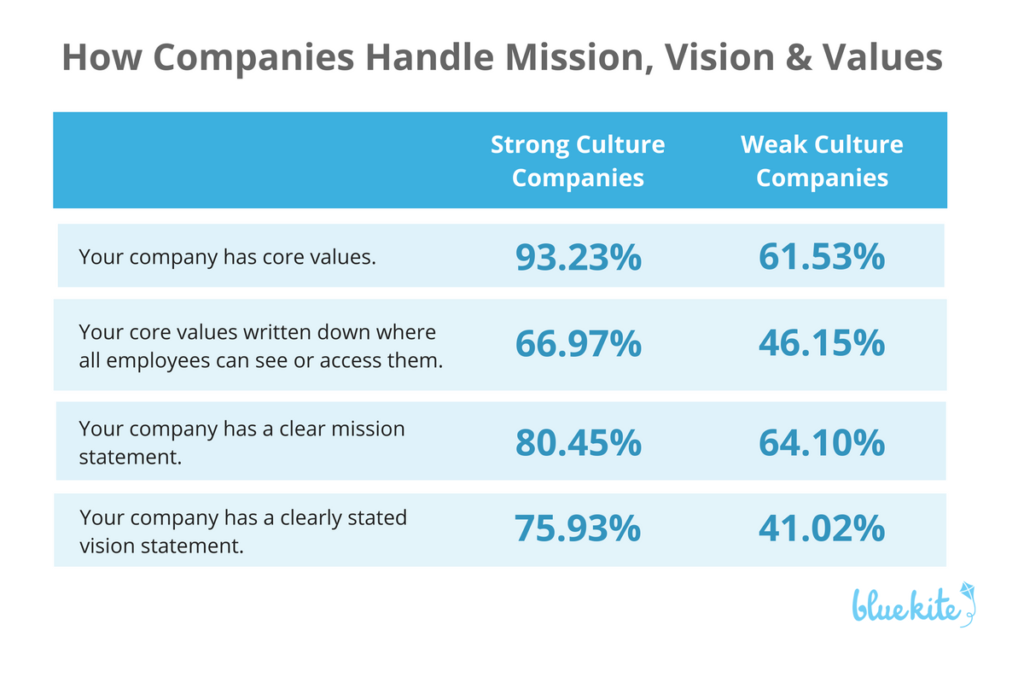 Key takeaway: If you want to establish a strong, thriving culture at your organization take the time to create a compelling mission and vision statement that’s supported by core values.
Key takeaway: If you want to establish a strong, thriving culture at your organization take the time to create a compelling mission and vision statement that’s supported by core values.
5. Honesty and Transparency Matter to Culture.
We asked respondents about their relationships and communication with their fellow employees, supervisors and staff. Overall, respondents with strong culture prioritize relationships and communications.
When you compare these numbers with respondents with weak culture, some interesting data emerges. See the chart below.
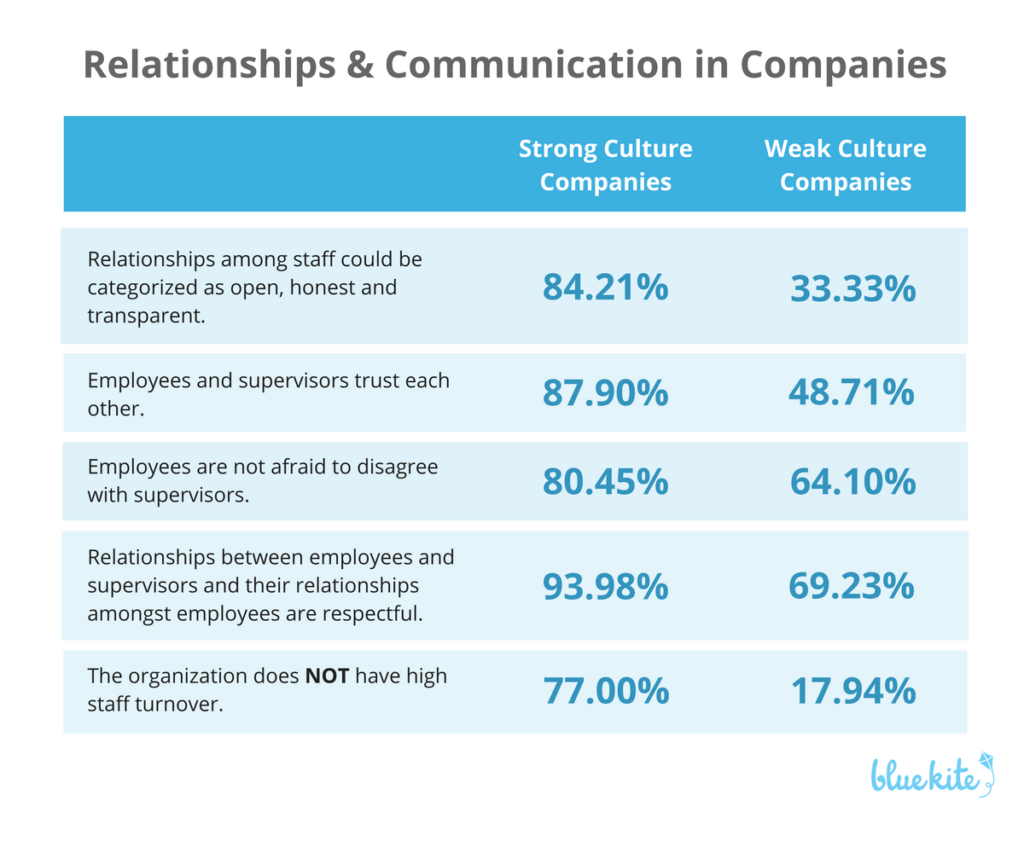 The biggest contrast appears when looking at the honesty, transparency and trust of relationships and the level of turnover with staff. It should come as no surprise that companies with weak culture have high turnover. That is a great reason why companies should make culture a priority in their organizations.
The biggest contrast appears when looking at the honesty, transparency and trust of relationships and the level of turnover with staff. It should come as no surprise that companies with weak culture have high turnover. That is a great reason why companies should make culture a priority in their organizations.
And to take this one step further, the numbers are even more striking when we compare leaders with employees. In weak culture organizations, 45% of leaders characterized their staff relationships as open, honest and transparent. However, only 18% of employees indicated their staff relationships that way. This further illustrates how leaders may have a blurred view of the culture reality in their organizations.
Key takeaway: Honesty and transparency breeds trust amongst your team. To create a strong culture, look for ways to increase transparency in your organization to win over the trust of your team. Doing this can improve employee happiness and help reduce staff turnover.
6. Strong culture companies invest in the wellbeing of their team.
We asked survey participants about the things they do to cultivate their employees and invest in their overall wellbeing. We found that organizations with a strong culture place an emphasis on providing an environment with a positive work/life balance. Strong culture companies were also far more likely to provide professional development opportunities than those with weak culture.
Here’s the breakdown:
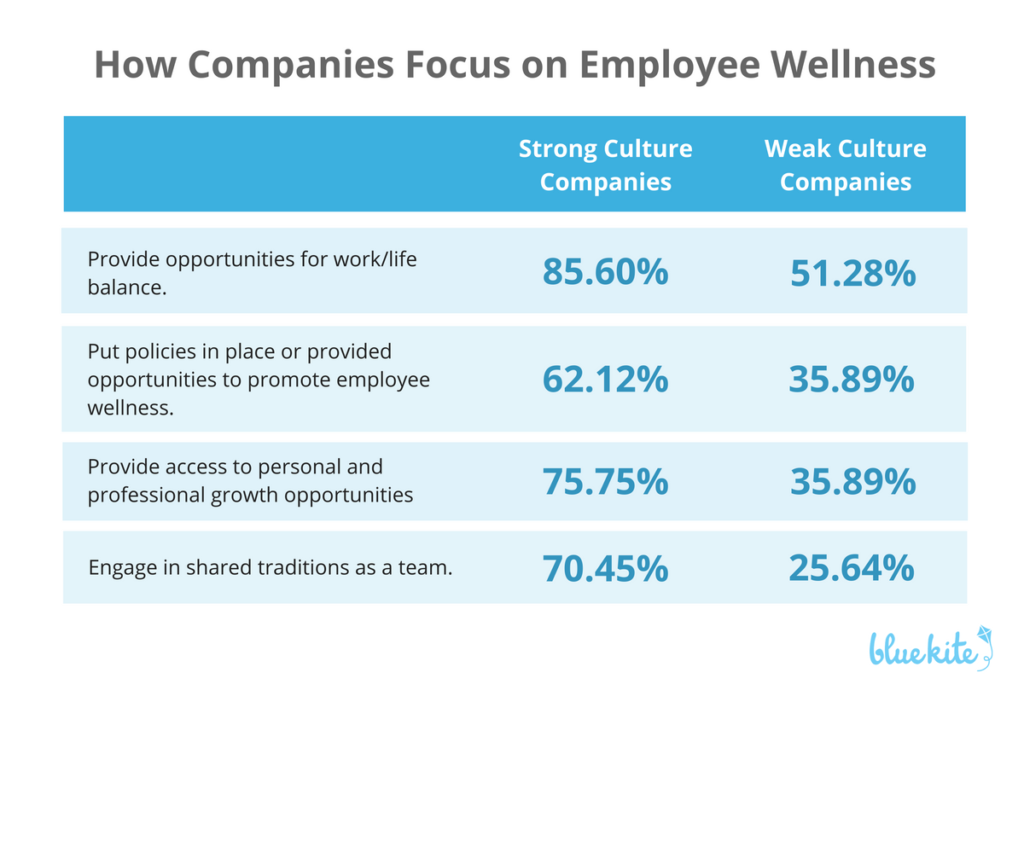 Although it might seem that weak culture companies are fairly good at creating a strong work/life balance, that number is a bit deceiving. When we examined responses between company leaders and employees, we found that 68% of leaders say they promote a healthy work-life balance and only 29% of employees felt the same way.
Although it might seem that weak culture companies are fairly good at creating a strong work/life balance, that number is a bit deceiving. When we examined responses between company leaders and employees, we found that 68% of leaders say they promote a healthy work-life balance and only 29% of employees felt the same way.
This shows there’s a bit of a disconnect between what company executives and employees see as a work-life balance.
Another key takeaway is that all companies aren’t especially strong at formalizing their employee wellness programs. This could be an area that organizations consider improving.
Key takeaway: Just because you think work-life balance is strong, your employees might not agree. Make sure you take the time to understand what matters to your team when promoting work-life balance.
7. Companies with strong culture have executives who invest more time in it.
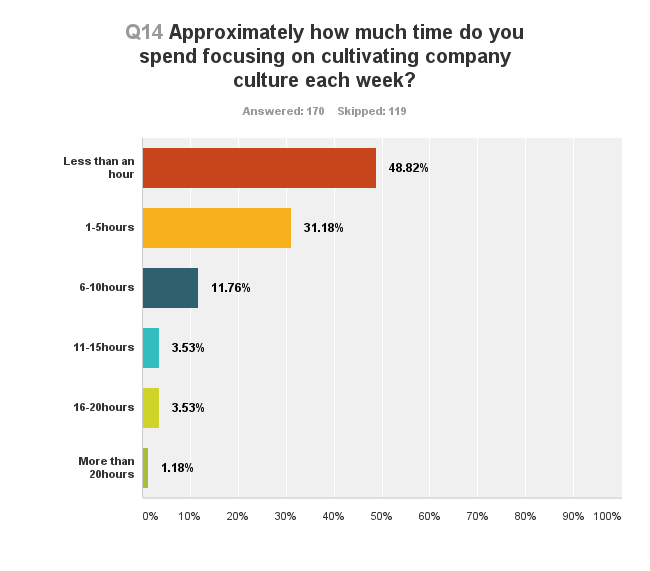 When we ask company leaders how much time they spend focusing on company culture, we found that almost half (48%) spend less than an hour a week on it. An additional 31% said they spend 1-5 hours on culture.
When we ask company leaders how much time they spend focusing on company culture, we found that almost half (48%) spend less than an hour a week on it. An additional 31% said they spend 1-5 hours on culture.
However, when segmenting the data to look at strong culture companies, we see that executives in these companies spend more time focusing on culture. In these organizations, 28% of executives spend six or more hours a week and 35% spend 1-5 hours
focusing on culture.
Key takeaway: It takes time to create strong culture. If you want to improve your culture, invest the time to make it great.
Additional Company Culture Research Findings
8. Perceptions of Communication Vary Between Employees and Leaders
We asked participants a series of questions about how they communicate with each other and recognize success. Interestingly, the gap between strong and weak culture companies wasn’t as large as other areas with one exception – strong culture companies are far more likely to discuss the work environment with employees.
Here’s a look at that comparison:
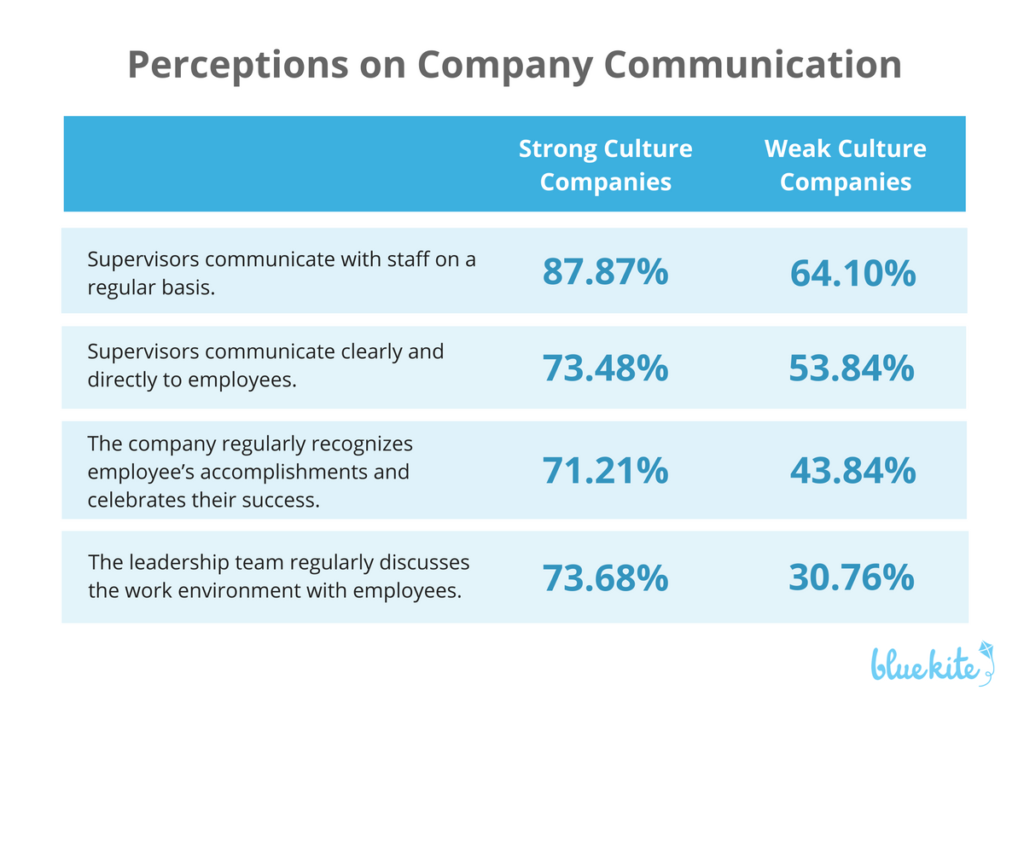 However, if we take a look at weak culture companies and break up the responses by leaders versus employees, we see a startling difference:
However, if we take a look at weak culture companies and break up the responses by leaders versus employees, we see a startling difference:
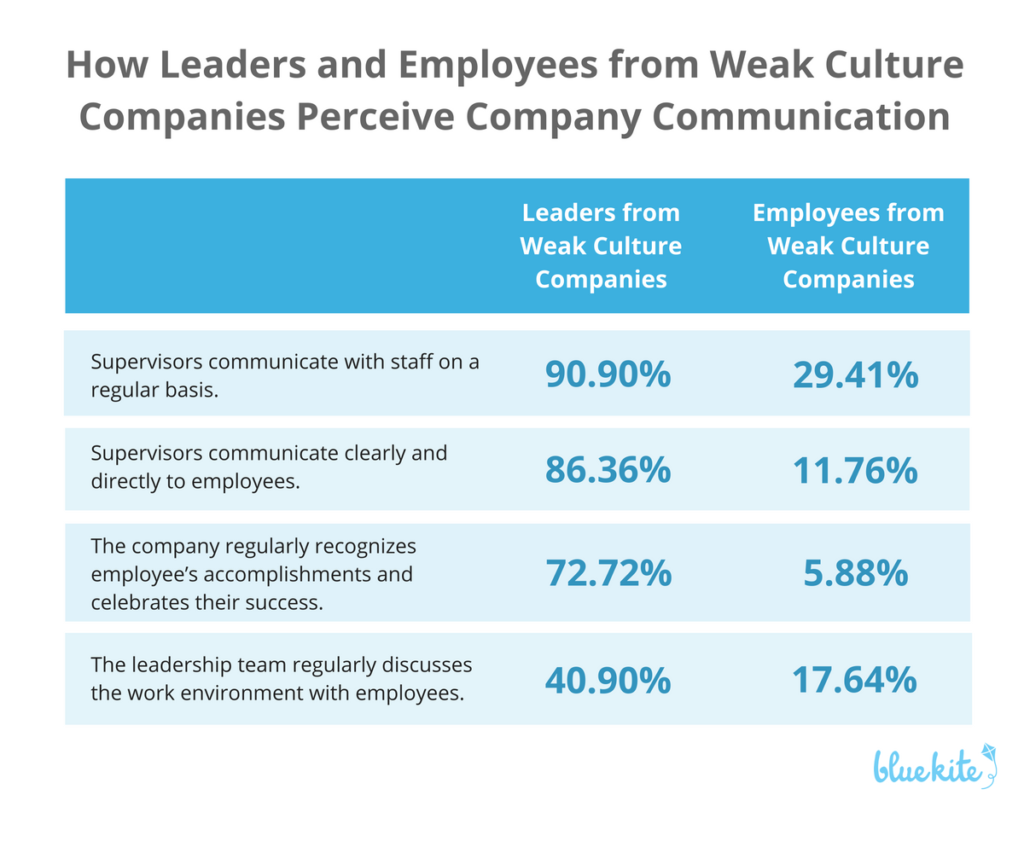 It is almost shocking to see how leaders feel they do a good job of communicating with employees and celebrating their success, while employees feel exactly the opposite.
It is almost shocking to see how leaders feel they do a good job of communicating with employees and celebrating their success, while employees feel exactly the opposite.
Even though leaders in these companies may very well be doing a good job in these areas, perceptions are reality. If employees feel they are not being celebrated or communicated with appropriately, they are likely to be more unhappy with the work environment and culture.
Key takeaway: Just because you think you are doing a good job communicating with your employees and celebrating their successes, your team may not feel the same way.
9. Physical space rarely reflects the brand.
Out of all the questions we asked about culture, physical space ranked the lowest for respondents. Even in strong culture companies, only 53% said the physical space – including design, decor and layout – reflects their brand. For weak culture companies that number was even lower at
24%.
Oftentimes, physical space and environment is the first thing people think about when it comes to culture. And yet, this data shows that it’s not the most important component to creating a strong culture.
However, this also demonstrates that there might be room for improvement in this area. Although your physical environment may not be a critical to creating a thriving culture, it certainly represents an opportunity to reinforce your brand and help your team feel energized and excited about their workplace.
Key takeaway: Want to improve your culture? Don’t focus on your physical space first. There are other areas that are far more important to creating strong culture.
10. CEOs are responsible for culture in most organizations.
We asked respondents about who is responsible for culture in their organization. Unsurprisingly, CEOs and Founders dominated responses and ranked the highest at 70%.
Interestingly, the next highest answer was “other” at 10%. These respondents were able to fill in an answer we didn’t provide and the majority of these suggested that the entire team is responsible for culture at their organization.
We also received a number of responses (8%) that said “no one” was responsible for culture at their organization.
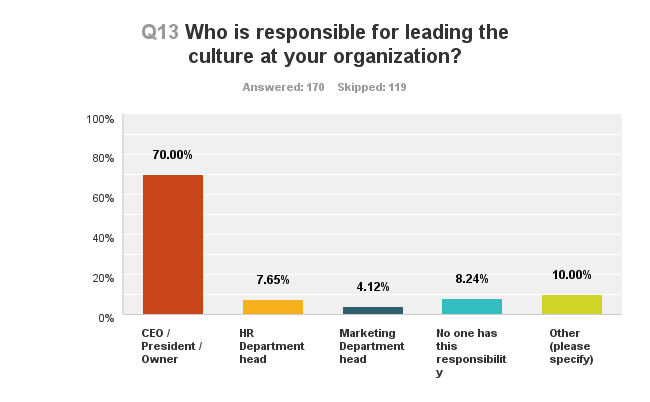 Key takeaway: The CEO or top leader of your organization is most likely the person in charge of culture. If that person is you, it’s important to recognize that you wield tremendous influence in the culture of your organization. If you don’t already focus on culture, it could be time to start thinking about it.
Key takeaway: The CEO or top leader of your organization is most likely the person in charge of culture. If that person is you, it’s important to recognize that you wield tremendous influence in the culture of your organization. If you don’t already focus on culture, it could be time to start thinking about it.
TL;DR: Key Recommendations to Creating Strong Culture
We know this is a lot of information to digest, so here is a quick recap with the highlights on what it takes to create a strong culture:
- Create a compelling mission and vision supported by core values.
- Focus on creating open, honest and transparent relationships with your team.
- Invest in the wellness and work-life balance of your individual employees.
- If you’re the CEO, take time to focus on culture (at least 1-2 hours per week).
- Just because you think you communicate well, doesn’t mean employees agree. Take time to get employee feedback on how to improve.
- Physical space matters, but it’s not the most important thing when it comes to culture.
How Great is YOUR Culture?
Does all of this have you wondering how your company culture measures up? We’ve got just the thing! Today, we are launching our brand new culture scorecard to help you measure the strength of your culture.
The culture scorecard is a simple, 10-question quiz that will evaluate your organization’s culture. It will take you less than 2 minutes to complete. At the end, you’ll get customized recommendations based on your answers. It’s pretty darn nifty!
Here’s a sneak peek:
 Click here to get your culture score. We think you’ll love it!
Click here to get your culture score. We think you’ll love it!
What do you think about these findings? Anything in particular stand out to you?
P.S. Congrats to Brian Hicks, winner of our drawing for the Amazon gift card! We’ll be in touch with your prize!



